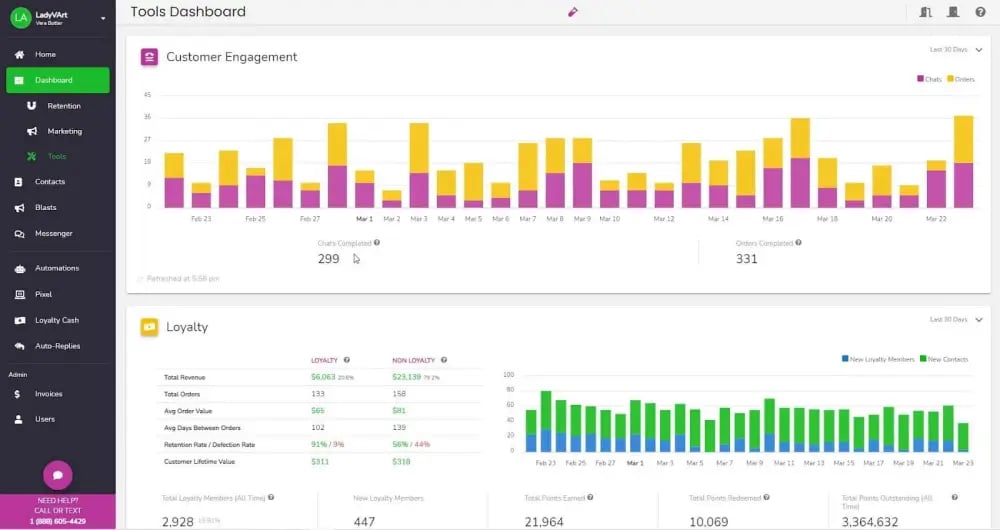Understanding Your Customer: How to Create a Buyer Persona That Works
Learn the step-by-step process of creating buyer personas that will fuel your data-driven marketing strategies and ensure you reach the right...
Explore the benefits of adopting a CRM for your eCommerce business and find the best solutions to enhance customer engagement, sales, and loyalty.

SuperOffice reports that 86% of customers are willing to spend more money if companies give them a better buying experience but is a CRM for eCommerce really worth the money? Stick around to find out.
| TLDR Key Takeaways |
| eCommerce CRM software helps improve client retention, increase customer lifetime value, and boost customer engagement. eCommerce CRM solutions typically come with features to help you spot hidden trends, patterns, and areas of improvement. CRMs work best for B2B eCommerce because of the higher average order value and LTV numbers. |
The short answer is yes, especially if you’re a B2B company.
Let’s take a closer look at the key ways in which eCommerce CRMs are instrumental in steering your online store down the path to success.
CRM (Customer Relationship Management) systems offer numerous benefits for eCommerce businesses. They enable businesses to personalize customer experiences, streamline marketing efforts, enhance customer support, improve sales conversions, and foster long-term customer loyalty.
Let's take a look at the main benefits:
eCommerce customers are spoilt for choice when it comes to the communication channels and media they have at their disposal.
While this does give your business more ways to reach your target audience, it also makes it harder to compete as you must now tailor the experience of each customer to a specific marketing channel.
eCommerce CRM software simplifies this challenge by allowing you to easily record a customer’s personal information and behavioral practices across every single one of those channels.
This makes it easier to leverage omnichannel marketing strategies and deliver stellar customer experiences.
eCommerce CRMs allow you to store and analyze critical data about your customers to help you create data-driven customer segments.
Not only does tailoring your strategies through customer segmentation let you create personalized experiences for your users, but it also allows you to maximize conversions. This is especially useful for B2B eCommerce companies.
Since B2B sales are more complex than B2C sales and generally involve longer lead nurturing cycles, B2B eCommerce companies stand to benefit significantly from CRM software simply because they allow them to create laser-focused account-based marketing strategies to dramatically increase conversion rates.
A B2B eCommerce CRM uses data to identify popular products and make recommendations on what needs to be stocked and by when.
Inventory planning protects the company from losses because it will not buy slow-moving products.
That way, you know you’re on top of your customer’s needs at all times.
This is typically where a CRM comes into play, helping companies gain a deeper understanding of their customers to deliver a personalized customer experience.
And while CRMs have long become the norm in SaaS, is it a viable marketing tool for eCommerce businesses?

CRMs can help businesses increase sales by improving their ability to manage and analyze customer data.
Here are some ways in which CRM systems can help increase sales:
CRMs can help your sales teams manage their tasks and customer interactions more efficiently, allowing them to focus on building customer relationships and closing deals. By automating tasks such as lead tracking, sales forecasting, and customer communication, sales teams can streamline their workflows and be more productive.
With a CRM system in place, businesses like yours can segment their customer base according to factors such as demographics, behavior, and purchase history, allowing them to create targeted marketing campaigns that are more likely to resonate with their audience and drive more sales.
CRM systems can help you personalize your marketing messages by leveraging customer data to deliver targeted offers and recommendations. They can also assist with automating your marketing campaigns, such as email marketing and social media advertising, to ensure that you reach the right audience at the right time.
You can use CRM systems to access valuable insights into customer behavior and preferences, allowing you to make data-driven decisions about your business’s sales strategies. By analyzing customer data, you can identify trends and patterns, as well as areas for improvement, and adjust your sales tactics accordingly.
CRM systems enable businesses to better understand their consumers, personalize interactions, and create great customer experiences by collecting and analyzing customer data.
Here are other ways CRMs can help businesses boost client loyalty:
With a CRM system in place, you can track customer interactions and respond to customer inquiries and issues more efficiently. This can help you improve customer satisfaction and loyalty.
You can implement targeted loyalty programs that reward customers for their loyalty and encourage repeat purchases using a CRM.
An eCommerce CRM software can help your business collect and analyze customer feedback to identify areas for improvement and make changes to your products or services based on customer needs and preferences.
Using a CRM system, your business can offer personalized experiences to customers, such as personalized product recommendations and targeted marketing messages. This can help build stronger relationships with customers and increase sales.
The right time to implement eCommerce CRM software depends on the needs of your business. It's important to evaluate the costs and benefits of implementing a CRM system and ensure that it aligns with your business's overall goals and strategy.
The main difference between the two is that an eCommerce CRM is designed specifically for use by eCommerce companies, with its features tailored specifically to the unique needs of online businesses.
eCommerce CRMs integrate with eCommerce platforms, offering features for order and inventory management, emphasizing personalization and segmentation, enabling multichannel customer support, and integrating with marketing automation tools.
These specialized functionalities cater to the unique needs of online retail, allowing businesses to effectively manage customer relationships, streamline operations, and deliver personalized experiences to drive customer loyalty and maximize eCommerce success.
The top features include identifying at-risk customers, analyzing an email subscription list, tracking the cart abandonment rate, built-in loyalty program, omnichannel messaging, and much more if an eCommerce CRM is truly going to be worth the money.
A good eCommerce CRM should have three main elements:
Below, we have reviewed three leading eCommerce CRM solutions that can be used by online businesses to increase their revenue and drive more sales, and increase customer retention.
Patch is the best customer retention CRM. It boasts several customer retention features, such as a customer loyalty program, a text chat widget, and the ability to support customers on platforms such as Shopify Plus.

This (customer relationship management system) CRM retains customers by automatically sending rewards to shoppers who refer their friends or join a list. Despite the numerous features, some users feel the platform requires a longer learning curve to understand its full potential.
Here’s a quick video showing how Patch works:
Signing up is easy. Patch Pro’s subscription plan unlocks unlimited access to a host of data-centric customer retention and loyalty marketing tools for only $295/month.
As a leading customer retention program, Patch is a go-to solution for eCommerce brands looking to enhance their CRM strategies. Schedule a demo to discover how your company can boost its customer retention efforts with our suite of features today.
Customer relationship management is essential to an eCommerce business’s growth and profitability.
Leveraging CRM software geared specifically towards eCommerce brands is key in helping you build marketing campaigns that truly resonate with your audience and increase your long-term CLV.
If you want to learn more about how Patch can help take your eCommerce business to the next level, get in touch with our team today to schedule a free demo.
Learn the step-by-step process of creating buyer personas that will fuel your data-driven marketing strategies and ensure you reach the right...
Explore Patch Digital Waivers: secure, e-signature solutions that boost efficiency and compliance in customer engagement.
Discover the power of automated text campaigns with the best texting software for business communication. Elevate your strategy and engage with...